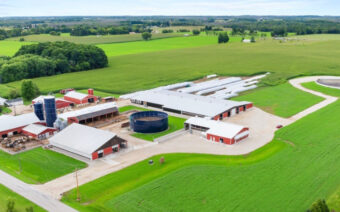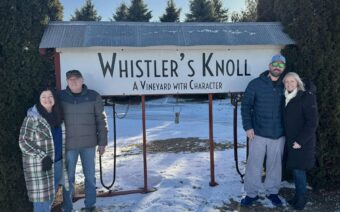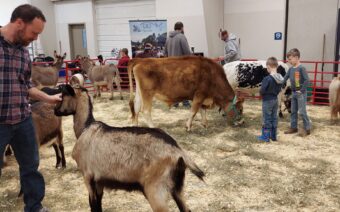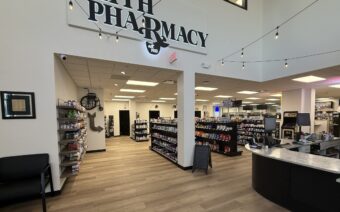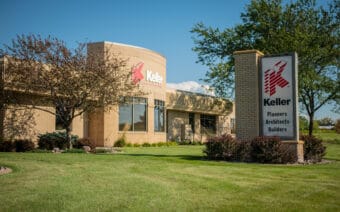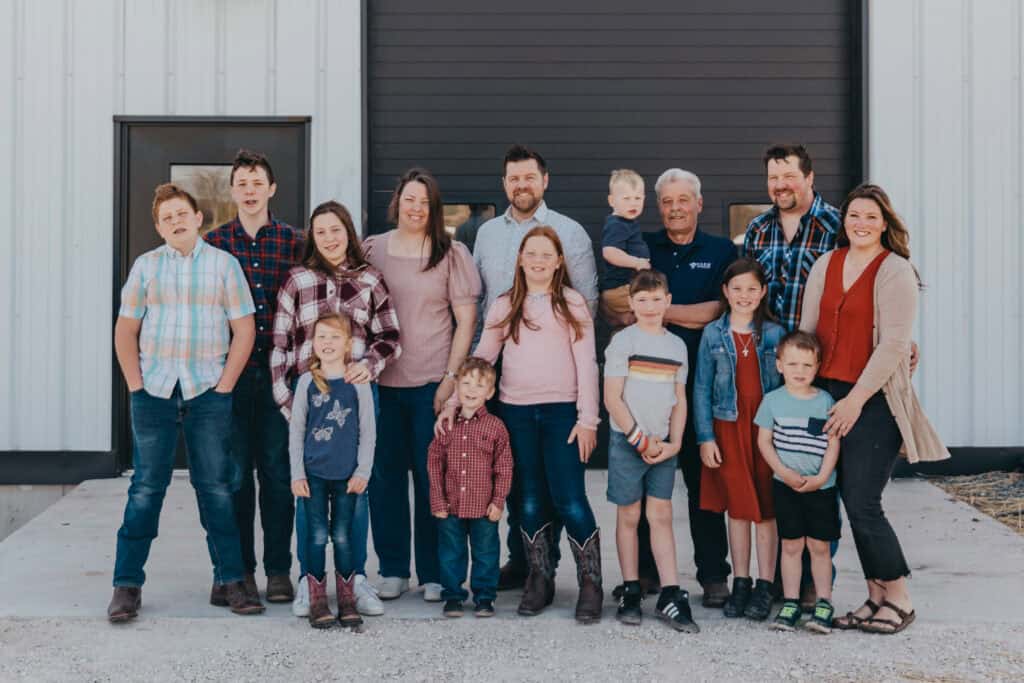
June 16, 2025
CEDAR GROVE – Though Brothers Brody and Jory Stapels grew up on a dairy farm, neither of them originally planned to carry on the farming tradition as adults.
“We were both raised on a dairy farm and both left it, realizing later in life that it was our true calling,” Brody said. “It took us a few years, but eventually we found this farm (W3653 Hoitink Road) and started here with the help of our dad in 2012.”
Brody said not only has the farm found success in the last 13 years, but it has branched out – first with beef cattle, eggs and honey and most recently with the opening of the Farm Stapels Creamery.
The vision
Though both he and Jory realized they wanted to return to a farm lifestyle, Brody said it didn’t happen overnight.
“I was working in landscaping at the time,” Brody said. “My wife (Carolyn) and I were newly married, we had a brand new house in town and we were expecting our first child.”
Brody said the idea of returning to farming hit him during a family camping trip.
“I sat down on a beach while we were camping one weekend, and I told my wife, ‘I’d really like to farm,’” he said. “She said, ‘Yeah, that’s fine. Let’s get a goat, a sheep and a pig.’ And I said, ‘I want to dairy farm.’ She said, ‘No, not a chance.’”
Having a grandfather who was a dairy farmer, herself, initially, Brody said his wife “wanted nothing to do with it.”
However, Brody said after he shared his vision with his wife, she was on board.
“My dream was to be able to raise my children and show them the sense of responsibility and work ethic I had learned,” he said. “Being able to demonstrate and show them this entrepreneurial American spirit, where if you set your mind to something, you certainly can get after it.”
This shared epiphany between him and his brother, Brody said, happened in 2009.
“We didn’t officially start the farm until 2012,” he said. “We spent three years pretty much banging our heads against the wall trying to figure out how to make a small family farm cash flow.”
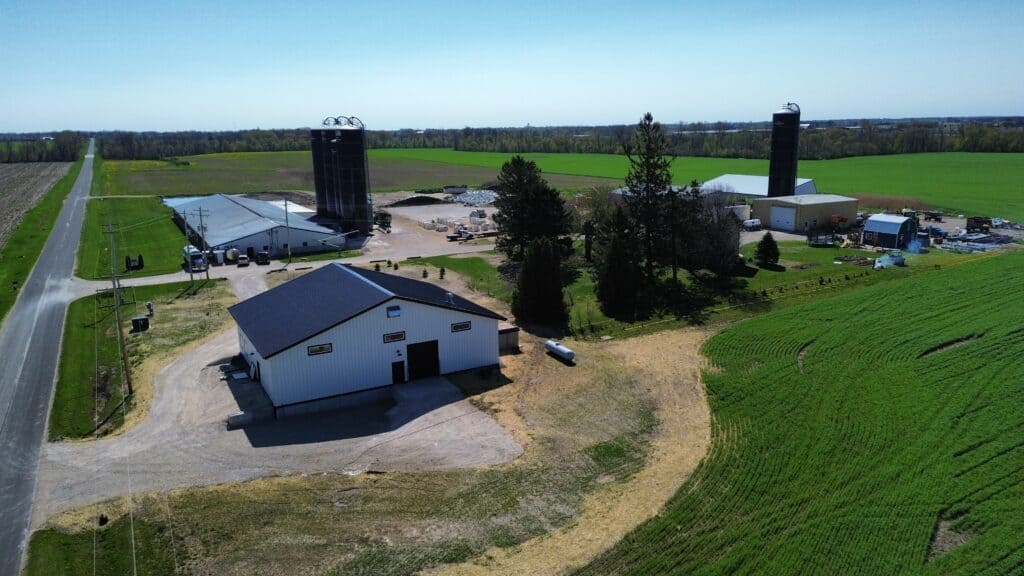
When he and Jory first looked at the Hoitink Road property with their bankers and consultants, Brody said they told us, “it’s not going to work.”
“So, we found a whole new team of bankers and consultants, and that was the team that believed in us and said, ‘Yeah, I think we can make this work,’” he said. “It’s important to surround yourself with people who believe in you and your vision.”
The grand vision of the farm, Brody said, begins and ends with sustainability.
“We are very intentional with regenerative agriculture,” he said. “The motto here is: ‘We need healthy soil for healthy plants for healthy animals for healthy people.’”
And though Farm Stapels is not certified organic, Brody said “we are certainly very cognizant of what goes on the soil.”
“We believe in the five soil health principles,” he said.
Per the U.S. Department of Agriculture, those five principles include:
- Using plant diversity to increase diversity in the soil
- Managing soils more by disturbing them less
- Keeping plants growing throughout the year to feed the soil
- Keeping the soil covered as much as possible
- Integrating livestock to recycle nutrients and increase plant diversity
Today, Brody said Farm Stapels has dairy cattle (a special blend of Holstein and Jersey crosses), beef cows (primarily Angus), honey bees, chickens (Black Australorps) and pigs.
Their newest venture, he said, is the newly opened Farm Stapels Creamery.
The creamery
Brody said the original idea behind bottling milk came from Jory around the same time they decided to start the farm.
“My brother always said he wanted to bottle milk,” Brody said. “I always told him that he was crazy.”
Besides, he said those first several years were spent getting the farm up and running – “getting a business started is pretty challenging.”
About a decade into the journey, however, Brody said his brother reintroduced the idea.
“The idea of a milk bottling plant came up again in the latter part of 2022,” he said. “We had diversified our operation quite a bit already – we bought a neighbor’s farm, we have a feed lot, we have beef cattle, we are milking dairy cows, we have a flock of chickens.”
Though there wasn’t a desire to milk more cows, Brody said they wanted to continue to diversify the operation.
“We said, ‘Okay, well, if we are going to do this, we are going to do it right,’” he said.
The creamery journey, Brody said, started in December 2022 with “business plans and securing equipment and looking at buildings.”
This process, he said, included visiting other processing plants throughout the Midwest.
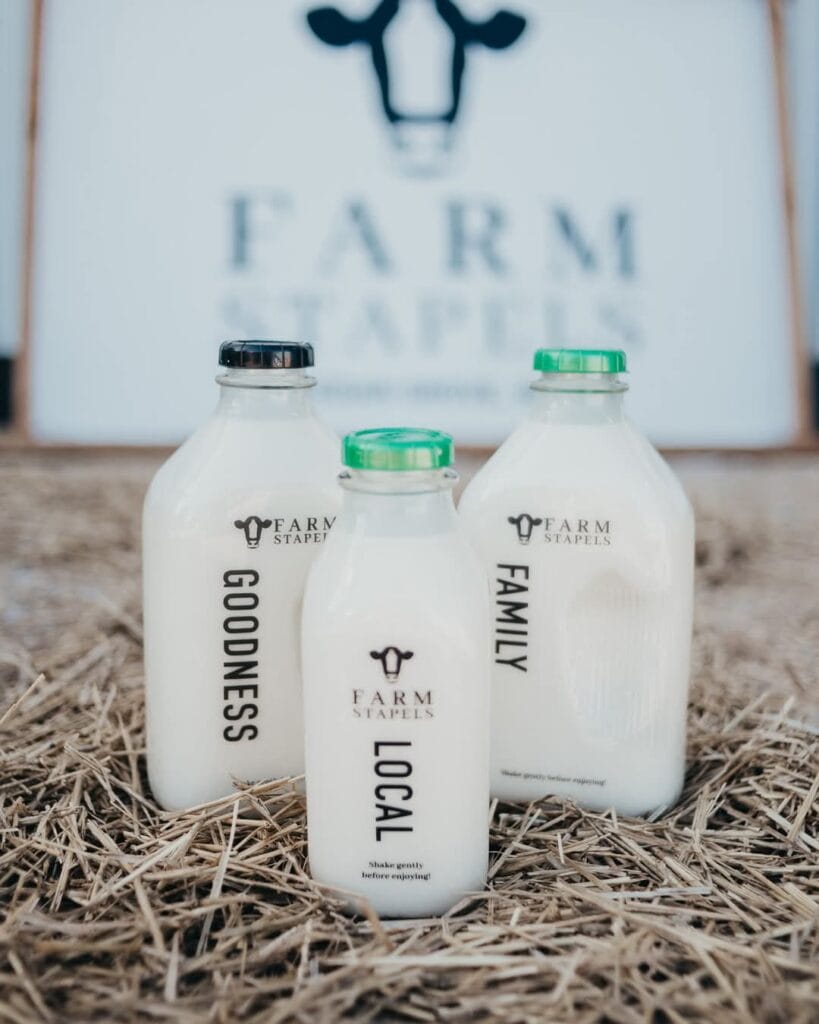
“We went to Kansas City, we went to Minnesota, northern Wisconsin,” he said. “We got an idea of layout and how to build these things.”
Much of the work – except for electrical and refrigeration – Brody said, was done by him, Jory and a handful of Farm Stapels employees.
“We didn’t hire an engineer,” he said. “We didn’t hire an architect. We are farmers – ‘get ‘er done’ kind of guys.”
For the frame of the creamery, Brody said they utilized a steel building they had purchased previously to use for a barn that never materialized.
“We worked with a local contractor who poured the concrete, and then we set the building up,” he said. “I think we had a daily run to Menards.”
In addition to the brick-and-mortar aspect of building a creamery from the ground up, Brody said “there was a ton of regulatory code reading.”
“There are pages and pages of construction standards, equipment standards, sanitary codes – we just kept learning and learning and learning and doing research,” he said.
All of this, Brody said, was done in tandem with their current farm operations.
The brothers broke ground on the project last February, and Brody said “430 days later, we put our first milk in a bottle.”
In addition to milk, he said the creamery – which held its official grand opening May 31 – has beef, honey and eggs available for purchase.
“We wanted to bring all the ‘Stapels’ of the farm right to the consumer,” he said.
Brody said the creamery’s glass bottles are significant for a variety of reasons.
“The first (reason) is, the taste is second to none,” he said. “It keeps it colder, and it doesn’t absorb a taste from the container.”
Farm Stapels’ glass bottles, Brody said, fit perfectly into the reduce, reuse, recycle mindset.
“You can bring the glass jar back, and we’ll get you a different one or be able to refill that same jar,” he said. “I’ve talked to some guys that keep that same jar in circulation for 10-15 years – so it’s certainly (significant) from an efficiency standpoint.”
Furthermore, Brody said in “an incredibly competitive” market, the glass bottles help Farm Stapels stand out.
“If we had just put our milk in a plastic jug – why is my milk any different from Kwik Trip or Aldi or Meijer?” he said. “We needed something to stand apart from others.”
In addition to glass versus plastic, Brody said the milk they are putting in the bottles is also different.
“Some people think milk is created equal, but it’s certainly not,” he said. “Our milk is low-temp(erature) pasteurized. The majority of the milk on the market today is high-temp pasteurized – high temp, short time. We do low temp, longer time. It’s certainly not the most efficient process, but we know that when you bring milk over 154 degrees, you start to denature some of the proteins in there.”
Brody said some customers have shared with them that for years they were lactose intolerant or lactose free, “but I can drink your milk.”
“They tell us, ‘we bought our last gallon of almond milk, and we’re never going back,’” he said. “That’s some of the things that really get us excited here, because those are our target people that we want to be able to drink good whole milk.”
Paced growth
Brody said they still send a majority of their milk to Sargento – “it’s used to make string cheese” – and that is the plan for the foreseeable future.
“My brother and I have said from the beginning that we don’t know if we want to bottle 100% of our milk,” he said. “It takes some of the risk off the table to be able to sell some of that milk to Sargento yet.”
As a working dairy farm, Brody said it’s important to remember that “milk comes every day.”
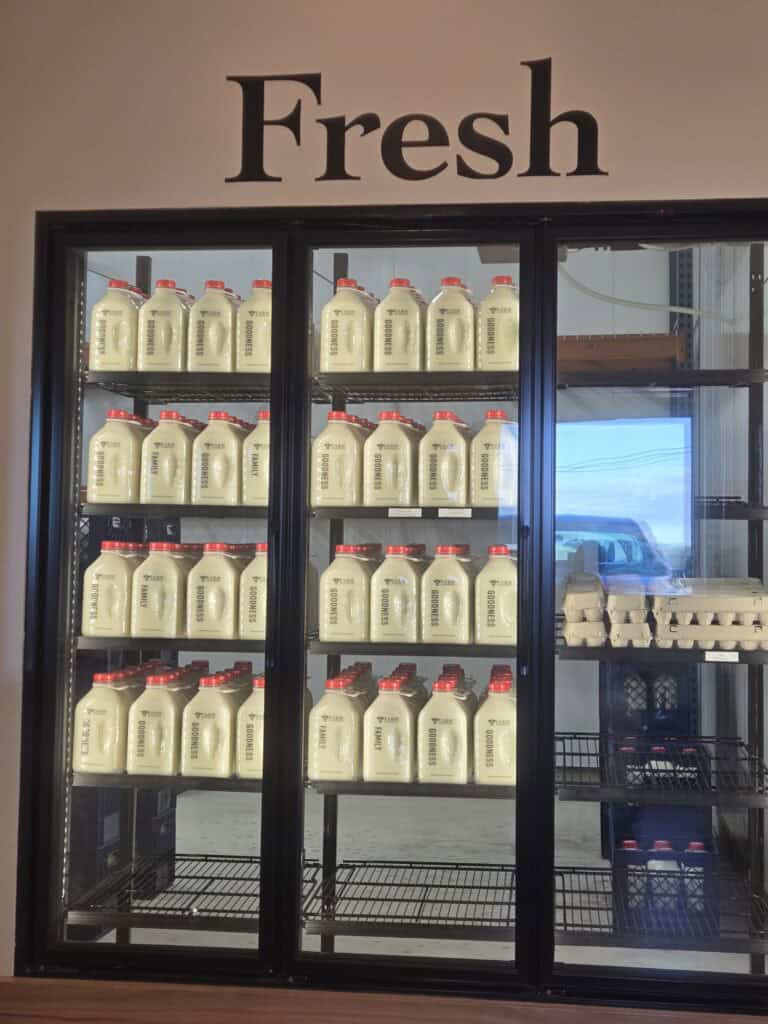
“Milk doesn’t have a great shelf life like cheese does – you have to sell the milk you put in a bottle to a consumer.”
Right now, Brody said they process milk one day a week.
“And it’s not even all of our milk from that one day,” he said. “We are ramping this thing up to see where it goes. We’re trying to build that audience and that clientele.”
Though Brody said “I certainly don’t want to be processing milk seven days a week,” increasing to two or three days a week is a likely possibility.
“I think if we are processing two or three days a week here, I’ll be a happy guy,” he said. “We are going to grow it as we can and with purpose. We don’t want to grow too fast.”
Home delivery
The creamery opening, Brody said, did prompt the hiring of a plant manager – “he kind of runs our dairy plant.”
Other than the manager, he said it’s him, Jory and the existing Farm Stapels employees who help run the creamery.
“We have hired a delivery driver as well,” Brody said. “Our long-term goal is to get into home (milk) delivery. We are doing that currently locally with eggs and meat. We’re looking at bringing the milkman back and expanding that.”
Brody said the creamery’s grand opening garnered a crowd of about 1,000 – each one providing him with an opportunity to share his passion with them for what he does.
“(Connecting with the consumer directly) takes a lot of time – everybody wants to come in and hear your life story,” he said. “But my mom always told me I’d be a good salesman, not a farmer. Now, I get to be both.”
Head to farmstapels.com for more on Farm Stapels and its newly opened creamery.
 From the Minor Leagues in Appleton to the big stage
From the Minor Leagues in Appleton to the big stage SentryWorld’s Rainbow aces PGA resort award
SentryWorld’s Rainbow aces PGA resort award



